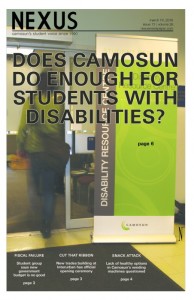The Camosun College Women’s Collective, in its attempt to make a female-friendly space, has missed the true meaning of feminism. With International Women’s Day still fresh in our minds, I think they need to be reminded.
The collective’s lounge, also known as the Women’s Centre, is a room in the Richmond House dedicated to women. It is reminiscent of a teahouse for ladies in days gone by, where women got together to chat and work on projects together. On the darker side of things, it’s a place that women can go to escape from, well, men, and feel safe on campus.
I can’t help but wonder, how is this helping the feminist movement?
Feminism has a bad reputation, so much so that I have heard it used as an insult; using the title of “feminist” in a social setting basically tells everyone in the room that any conversation with said feminist will make people either feel sorry that they were born a man or that they even contemplated for one second that men might be alright.
It gets very lonely after that by the snack table.

In reality, feminism just means advocacy of women’s rights on the grounds of political, social, and economic equality to men. What person who has any sort of relationship with a woman wouldn’t want that?
Don’t get me wrong: there is a great need for support centres for women, both in Canada and in the rest of the world. According to the Canadian Women’s Foundation, 67 percent of Canadians know a woman who has experienced physical or sexual abuse. Women are still paid less than men on average, women are still dominantly victims of violent crimes, and it is estimated that at the current rate of reform, women will finally be seen as equals to men in the year 2090.
Clearly, the world has a very long way to go to achieve gender equality, and just the fact that a space like the women’s lounge exists on campus demonstrates this. But however nice the space is to be in—because it is a very pleasant room to spend time in and is a valuable space for women on campus—the lounge doesn’t have the ability to protect women from violence and isn’t staffed by counsellors to help traumatized women; its sole purpose seems to be to ensure gender segregation.
In 2016, it’s clear that the old model of fighting inequality has not been as successful as it needs to be. On September 20, 2014, actress Emma Watson gave a speech in her capacity as a United Nations women’s goodwill ambassador; in her speech she hit the nail on the head in terms of what has been missing in the feminist campaign: men and boys.
The word “feminism” is synonymous to the women’s movement. If we are going to be successful in attaining gender equality any time soon, this needs to change. A good place to start is our learning institutions.
Let’s turn the Women’s Centre into the Equality Centre and invite our male counterparts into our world. Maybe then they will be more inclined to help us fight the discrimination and violence that we still face.

What are your resources that you base your piece on? I’m interested to learn your critical ideas about feminism. At the moment, the piece reads like its author had a casual 5-minute conversation about “the f-word” and, as a result, thought up some under-researched ways to “explain” why feminism “isn’t working”. Not helpful (for anyone) either.
Maybe it would help to know within which framework(s) you yourself approach feminism and then reconsider where and how you situate the Collective in that context?
Speaking of which, are you familiar with the policies of the Collective and what kinds of initiatives they have been taken towards – what you conveniently squeeze into a binary – equality?